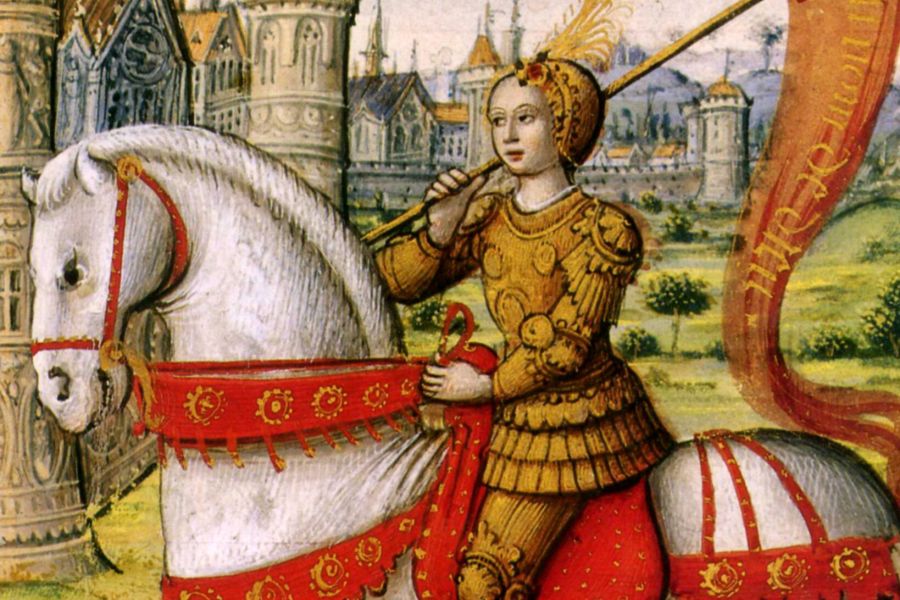A Profile of Abigail Favale: Feminism, Gender and an Unlikely Conversion
For Favale, it was the experience of motherhood that served as ‘one of the major catalysts’ for her eventual conversion to Catholicism, she told the Register.

As Abigail Favale settled at her desk for our interview over Zoom, I noticed a tattoo of St. Joan of Arc on her upper arm, partially covered by short sleeves and long, dark, wavy hair draping freely over her shoulders. An eloquent writer with a robustly formed intellect — exemplified in her most recently published book, Genesis of Gender: A Christian Theory — Favale’s in-person demeanor is approachable and down-to-earth, occasionally betraying glimpses of her sense of humor beneath the professional surface of our online interview.
“I’m looking right now at all these pictures of holy women I have on my wall,” Favale said, as she recounted her journey from evangelical Christianity, through an academic career in postmodern feminist theory, to her reception into the Catholic Church.
“There’s this presence of the feminine that’s beautiful, and real, and incarnational,” she said. “I was hungry for that.”
Formed by decades of gender and feminist theory, and her subsequent conversion to Catholicism, Favale has a lot to say about the increasingly prevalent ideologies that seek to change how gender is socially, legally and editorially defined.
“Once feminism abandons the notion that woman is a category that names something real, it’s lost its reason for being, and it becomes incoherent,” Favale told the Register. “Same with the university: If the university no longer holds to the idea that truth exists, it’s lost its reason for being. There has to be that reclamation of truth.”
Favale spoke to the Register in late summer 2022 from her then newly acquired office at the University of Notre Dame’s McGrath Institute for Church Life. She had recently assumed the position as a professor, tasked with creating a curriculum to offer a Catholic perspective on issues pertaining to sexuality.
In the years since her 2014 conversion to Catholicism, Favale has been lending her voice to the conversations around feminism and sexuality, notably through her 2022 book, Genesis of Gender, preceded by her 2018 memoir, Into the Deep: An Unlikely Catholic Conversion. Her background in gender studies has given her a vantage point from which to assess the cultural climate surrounding questions of gender that, following her conversion, she now views through the lens of Catholic anthropology.
“I’m not overtly hostile to my academic background in gender studies and feminist theory,” Favale said. “I now see it differently. I come at it from a different perspective.”
The Lure of Feminism
The feminist ideals to which Favale was exposed as a young college student had come as a welcome alternative to the messaging she had received from the evangelical Christian culture regarding purity.
“When I first encountered feminism, I thought: ‘This is it. This is what I’ve been looking for,’” Favale told the Register.
Having grown up an evangelical Christian, Favale said she had become “dissatisfied with the account of femininity and sexuality” she had been raised with, which emphasized the importance of a woman’s sexual purity, which, once compromised, was “really hard to get back.”
“I was wounded by the purity culture, especially,” she said. “By the time I went to college, I really was in a state of having felt like I completely lost my self-worth. I was craving a sense of dignity, especially as a woman.”
Although Favale initially “tried to bring together evangelicalism and feminism” by “interpreting the Bible correctly in a way that promoted egalitarianism,” she eventually “absorbed this feminist hermeneutics of suspicion, just by reading a lot of feminist theory.”
“I wasn’t practicing Christianity in any way,” she said. “I wasn’t going to church. I wasn’t praying. I was just dissertating. I had reduced Christianity to this cultural artifact to be studied, but nothing that really brought any real conversion in my life.”
As Favale delved deeper into the writings of the leading voices in postmodern feminism, however, she began to become disillusioned. “There’s a lot of obfuscation and equivocation that happens,” she said, citing the lack of coherency in the movement’s “internal logic,” which has “a lot of contradictions.”
A notable example of her disillusionment came when she learned that some of the leading thinkers in the field — like Simone de Beauvoir, a prominent figure in the feminist movement — had petitioned, in the 1970s, for eliminating the age of consent in France.
“If your philosophy leads you there” — that is, towards defending the abolishment of the age of consent for sexual intimacy — “there is something rotten at the root,” Favale writes in The Genesis of Gender.
Feminism Upended
For Favale, it was the experience of motherhood that served as “one of the major catalysts” for her eventual conversion to Catholicism, she told the Register.
Favale gave birth to the first of her four children in 2012, entered RCIA in 2013, and was received into the Church in 2014.
“It really upended a lot of my tidy feminist beliefs, such as the idea that gender is primarily socially constructed,” she said. “I think the reality of femaleness hit me in a way that I had not experienced before, so I began to question the simple narrative about the social construction of reality.”
“I just began to realize that my feminist beliefs didn’t have really robust things to say about what I was now experiencing through pregnancy, and childbirth, and motherhood,” Favale added. “I was like: ‘This isn’t enough anymore.’”
It was also during this period that Favale, then employed as a professor at George Fox University, had begun to observe “a really remarkable shift” with regard to attitudes and terminology around sexuality and gender.
Prior to this, students taking her gender-theory classes “would often come with a good deal of skepticism about some of it.”
Favale still considered herself a “progressive feminist professor” who “wanted to help enlighten my poor students who grew up in evangelicalism like I did.”
The dynamic changed “suddenly” around 2013. “I was teaching gender theory, and I was like: ‘Wait a second. I think I actually have to strongman the Christian perspective here,’” Favale said.
“I was still very much progressive, considered myself a pro-LGBT feminist, but I was like: ‘What’s happening?’”
She recalled how these new students were “totally on board with the pro-LGBT position” but were unable “to charitably engage with a different position.”
It was then that she knew this was “different.”
“The students have shifted. The discourse has shifted. They’re already amenable to these ideas,” she said.
By 2015, “the students were way more progressive than I was, even as a new, still-progressive Catholic,” Favale said. “How do I teach gender theory now?”
“It was almost this runaway train,” she said. “Gender studies trudged along in the same basic terms that I had learned about it in graduate school, and then all of a sudden in 2015 it was this proliferation of new terminology.”
“And that trend has continued,” she added.
Favale admitted to the Register that it took her a while to accept certain aspects of the Church’s teaching on sexual morality, saying that the teachings on homosexuality were “the biggest hurdle for me in my conversion,” even more than women’s ordination or abortion.
“The other teachings that I wrestled with had to do with women, and I am a woman, so I kind of felt like I could accept it on behalf of my sex,” she said. When it came to homosexuality, however, “I was saying ‘No’ to someone else.”
Her views shifted over time as she adopted “an entire theology of sexuality.” “I tried to hold onto the theology of the body, and all the meaning I found there, for my own married-life circumstances, but then also continued to be affirming of gay marriage,” she said. “Eventually, I had to kind of reckon with the fact that I couldn’t hold both of those things together because the Church’s teaching on contraception is based on the same understanding of sex as its teaching on marriage and against same-sex sexual activity.” “One of the benefits as Catholics is that, at least, Catholic teaching is consistent,” she said. “Sex is how we participate in the transmission of human existence, and so all people are called to structure their sexual lives around that truth and to honor it,” Favale continued. “That requires self-restraint.”
The Genesis of Gender: A Response to the Times
In the current social climate, female athletes, including teenagers in high school, are being ordered not to voice their objections to sharing locker rooms or competing with biological boys who identify as girls.
Health professionals are prescribing pharmaceuticals to manipulate the puberty of children who question their gender, propelling them down a path of irreversible physiological changes, infertility, heightened health risks and lifelong medication.
And in the Church, the allowance for Catholics to change their names and sex on baptismal certificates to reflect a transgender identity is just one measure in a document endorsed by delegates at an assembly of German bishops in Frankfurt earlier this year.
Hence, the timeliness of Favale’s most recent book, The Genesis of Gender, which offers a historical and contextual blueprint of the evolution of feminist and gender theories that have laid the groundwork for contemporary confusion around gender.
“Her credibility is a great asset and will reach many in the gender-theory camp that would not be reached by many others in the Christian side of the debate,” said Father Alexander Albert, director of research for the International Institute of Culture and Gender Studies. “Abigail's experience as a feminist and as a convert puts her in a unique position to discuss the conflicts, the merely apparent tensions, and the shared foundations between the faith and gender.”
The Genesis of Gender is “an excellent resource for having a conversation about gender and femininity that is rooted in the Christian tradition,” Father Albert told the Register in an email.
Register contributor Carrie Gress praised Favale’s writing for its clarity and accessibility. The Genesis of Gender “is the kind of book that is a joy to read, instead of being grinding academic prose and shrouded in obscurity, which is what the feminist movement thrives off of,” said Gress, a scholar at the Institute for Human Ecology at The Catholic University of America. “It is hard to attack a position if you can’t figure out what it means.”
Favale’s analysis of feminist academia and Catholic teaching in The Genesis of Gender is structured around the narrative of her own intellectual and faith journey. In it, she outlines her initial attraction to the feminist movement, her disillusionment with some of its main actors, and her eventual embrace of Catholic teaching on sexual morality and gender.
Gress, who also serves as fellow at the Ethics and Public Policy Center and has a new book out, The End of Woman, praised Favale for her “artful way of blending tough concepts into an autobiographical sketch.”
“I think the greatest contribution of the book is that Catholicism has so much to offer about women that is compelling and beautiful,” Gress said. “Favale engages these arguments in very readable and human language.”
- Keywords:
- Abigail Favale
- conversion
- gender identity
- feminism
















